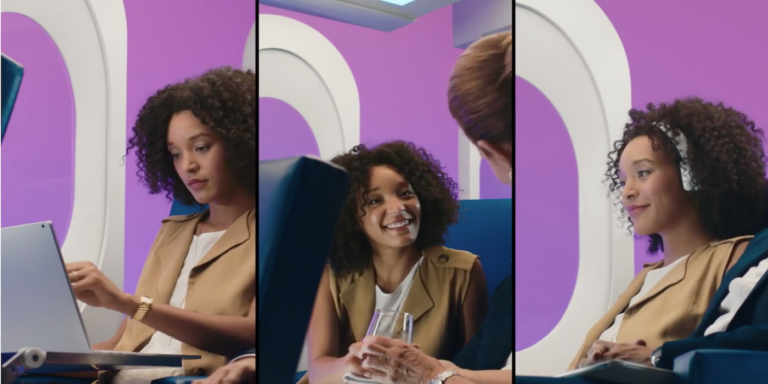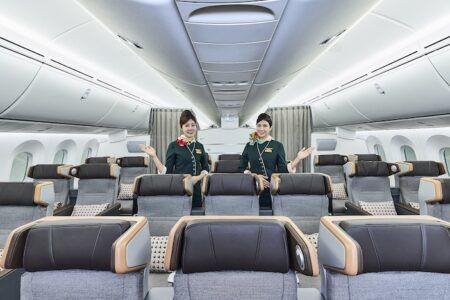Delta Air Lines CEO Ed Bastian has announced several technology innovations that he says will transform the future of air travel. Bastian was keynote speaker at CES in Las Vegas this week, possibly the world’s largest technology event, and during his address he outlined several initiatives that will be introduced beginning this year, including transformation of the Fly Delta app, Parallel Reality display screens, enhanced inflight entertainment (IFE) options, full-body wearable exoskeletons for maintenance operations, and an AI machine learning operations platform.
Looking first at Bastian’s IFE initiatives, something the airline is very involved in, having the most seat-back screens in the sky, and being the pioneer of free streaming content and free messaging on board. Delta also launched an in-house IFE startup called Delta Flight Products in 2016, which can work to make Bastian’s IFE dreams come true.
Delta is testing new features for the future of IFE, including a ‘binge button’ that allows passengers to relax and watch entire seasons of their favourite TV shows uninterrupted. For customers who prefer a personalised experience, Delta plans to pilot a ‘recommended for you’ feature that serves up a curated recommendation based on previous viewing behaviour. The airline will also test features like ‘do not disturb’ or ‘wake me for meal service’ for Main Cabin customers on select long-haul flights.
As part of the airline’s work to seek diversity, create equity and increase representation, Delta is also working to become the first airline with dedicated IFE channels spotlighting films and TV shows that meet the ReFrame Stamp standard – a mark of distinction for features that include female-identifying people in four of eight key areas of their production, including writer, director, producer, lead, co-lead, speaking parts, department heads and crew.
These dedicated channels will debut on board in February, with films and shows including Bumblebee, The Spy Who Dumped Me, Pitch Perfect 3, Wonder Woman, Crazy Rich Asians, Lady Bird, Mary Queen of Scots and Ocean’s 8, and Delta will continue building the collection throughout 2020 as new titles receive the stamp. Delta will also support ReFrame through a US$100,000 donation – in addition to the airline’s annual US$125,000 in-kind contribution to Women in Film – to help support a number of their initiatives.
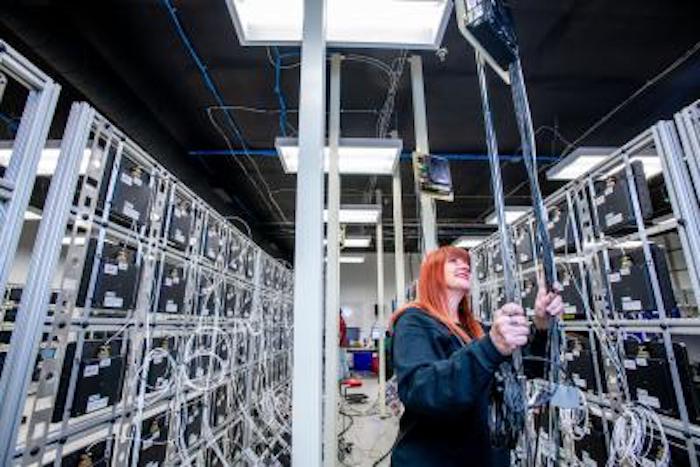
Watch Bastian’s CES 202 keynote address HERE.
FLY DELTA APP EVOLUTION
Delta Air Lines is also working to transform its Fly Delta app into a digital concierge that anticipates customer needs, offers convenient services like a taxi to the airport and delivers notifications, keeping customers moving seamlessly on their journey.
During the CES 2020 opening keynote, Bastian shared the airline’s plans to take a big first step in building its digital concierge by deepening its partnership with Lyft. Offering customers multiple points within the Fly Delta app to link Delta SkyMiles and Lyft accounts will make it easier for customers to earn miles during Lyft rides. Other features being explored include providing estimated arrival times powered by Lyft, testing a dedicated premium Delta-Lyft experience at some of the busiest airports in the USA, and offering the option to pay for rides using miles.
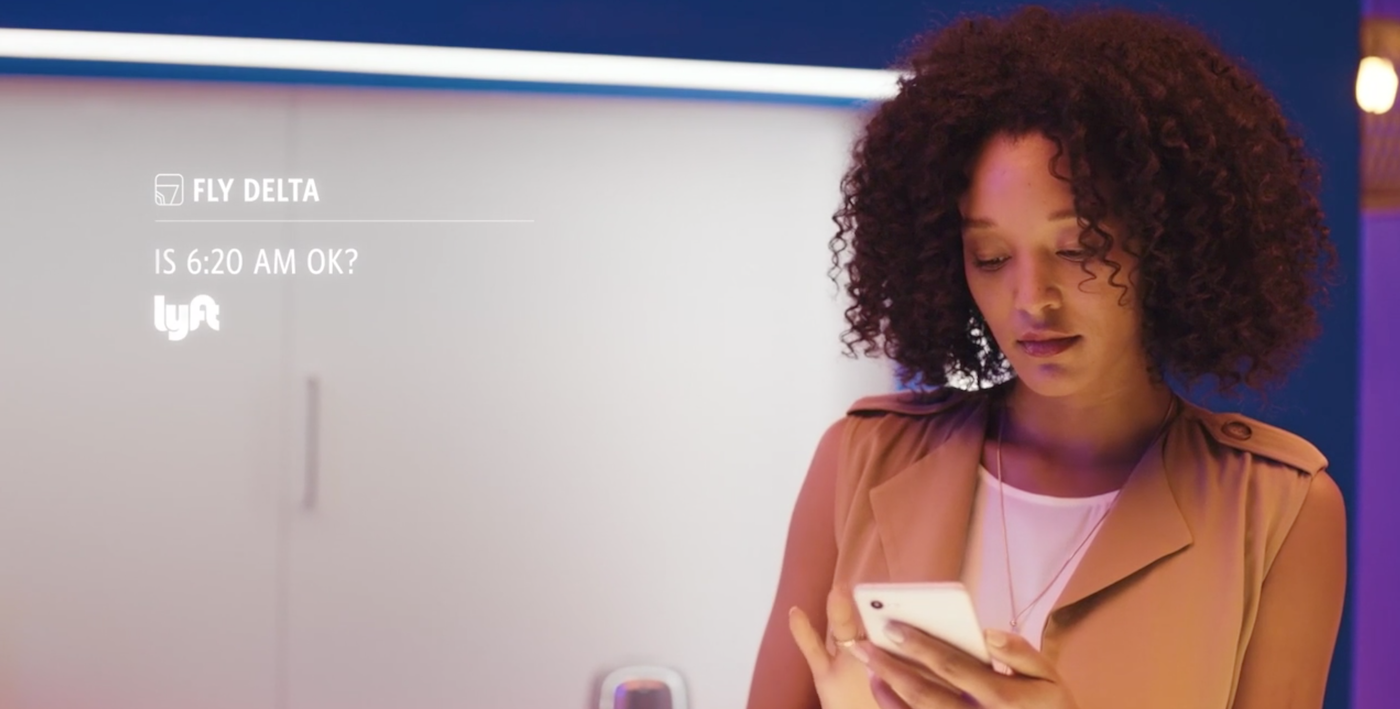
The next step comes later this month, when virtual queuing launches in Fly Delta to notify customers when their seat – not just their flight – is boarding. This adds to recent upgrades like integrating TSA wait times in select markets, offering pre-select meals and international auto-check-in – all designed to make travel more personal.
“Instead of checking one app for traffic, another for airport parking and a third for TSA wait times, Delta is building the capability to simplify travel by helping you manage everything from ridesharing and in-flight entertainment to bag delivery and hotels,” Bastian said.
PARALLEL REALITY TECHNOLOGY
Delta is partnering with Misapplied Sciences to launch the first Parallel Reality beta experience for customers departing Detroit Metropolitan Airport this year – the first step toward a future where the airport environment itself is tailored to each customer.
This opt-in technology allows multiple customers to see personalised content tailored to their unique journey on a single digital screen – at the exact same time and in their preferred language. At a glance, the technology will provide wayfinding and personalised travel information, like directions to your departure gate, or the closest Delta Sky Club.
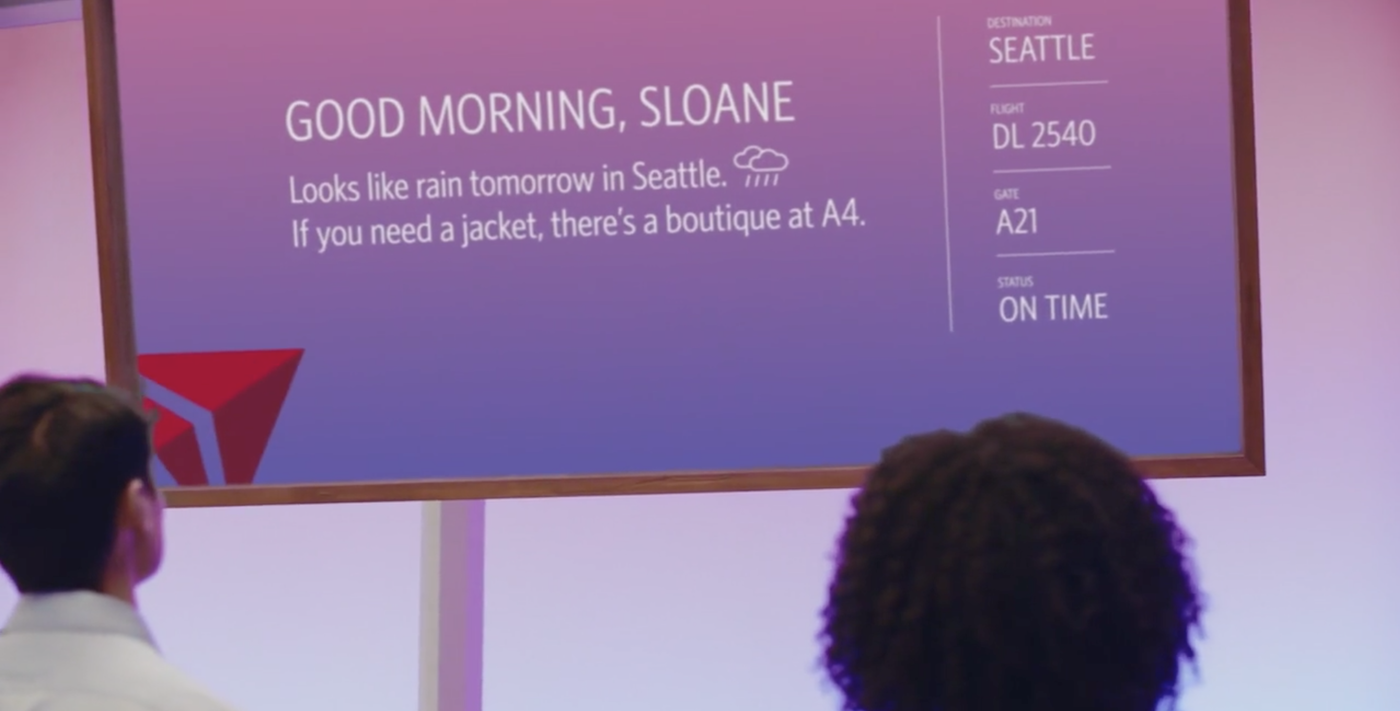
For the beta experience in Detroit, nearly 100 customers will be able to simultaneously view personalised content tailored to their individual travel on a single large-scale digital screen located just after security. Customer and employee feedback from this opt-in trial will be critical to shaping the future experience.
More details and a video of the technology in action can be found HERE.
OPERATIONS AI MACHINE LEARNING PLATFORM
Delta Air Lines is also creating a full-scale digital simulation environment for its global operations – a first in commercial passenger aviation – to bring reliability to the next level, particularly during bad weather and other disruptive travel events. The proprietary AI machine learning platform to its behind-the-scenes tools that will analyse millions of operational data points – from aircraft positions to flight crew restrictions to airport conditions – to create hypothetical outcomes that help Delta’s team make critical decisions before, during and after large-scale disruptions, like severe winter weather or a volcanic eruption. It’s also a post-mortem tool that can be used to identify how better decisions could have been deployed in a given situation.
Delta will launch the initial live implementation of the technology this spring. The tool is expected to continually become more effective over time, as more data is collected and integrated.
GENDER EQUITY PARTNERSHIPS
Bastian also chose this prominent tech forum, to announce partnerships with the Society of Women Engineers and Girls Who Code as part of the airline’s efforts to seek diversity, create equity and increase representation, particularly in STEM (Science, Technology, Engineering and Math) fields. The partnerships are intended to promote gender diversity by removing barriers, creating hiring pipelines and supporting community programmes.
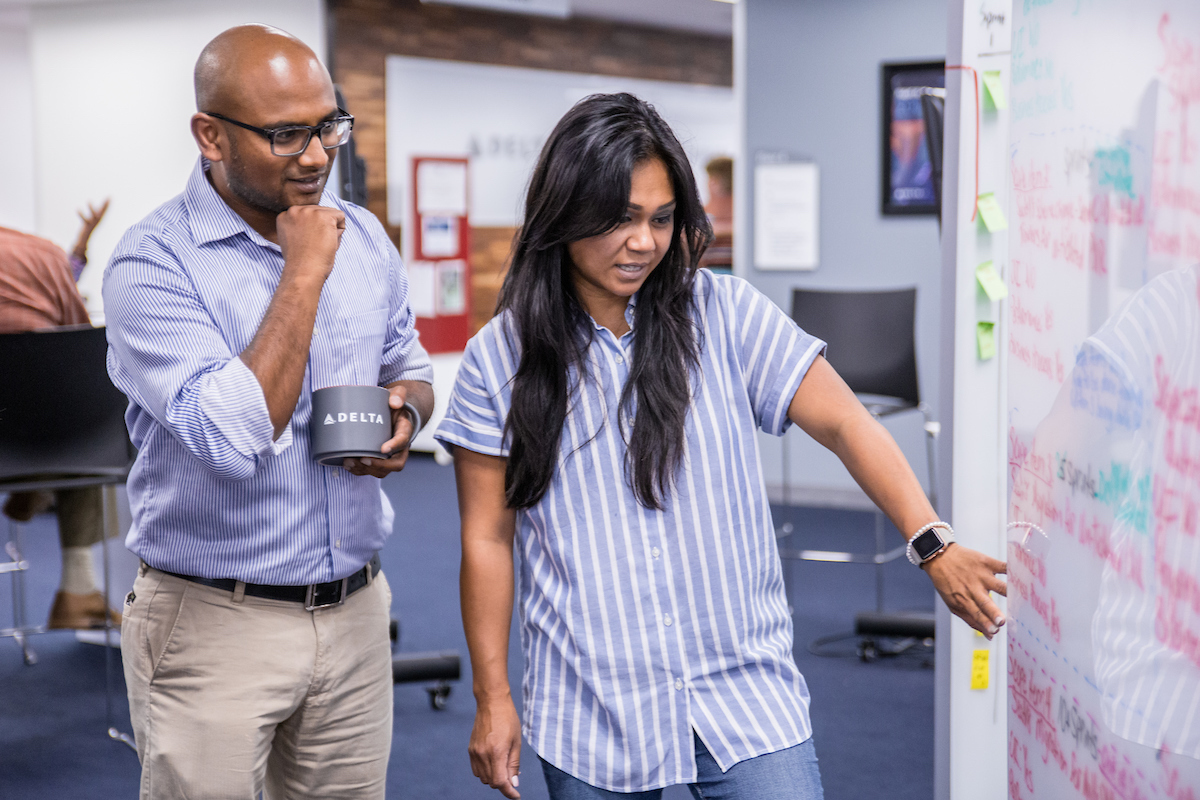
Delta’s partnership with the Society of Women Engineers, which is focused on empowering women to succeed in engineering and technology, will enable streamlined hiring and recruiting of women in STEM roles at the airline. The partnership will help Delta to improve its gender diversity by reaching qualified professionals with more than three years of experience. Delta will fund tech conferences and career fairs from the USA to India.
INVESTING IN SUSTAINABILITY
Sustainability is one of the hottest topics in aviation, and Delta Air Lines implemented renewable and natural environment solutions to offset emissions for its flights to and from Las Vegas during CES 2020 this week, so those customers fly carbon neutral. In the wider world, the airline is also making investments in verified projects to offset the carbon footprint associated with Global Citizen’s year-long Global Goal Live: The Possible Dream campaign, which supports the United Nations Sustainable Development Goals.
“Starting with voluntarily capping our carbon emissions at 2012 levels, we continue to reduce our footprint and invest in natural climate solutions as well as projects that support local economies worldwide,” said Bastian.
Delta will invest more than US$100,000 into The International Small Group & Tree Planting Program (TIST), a programme that supports subsistence farmers in countries such as Kenya and Uganda to reverse the effects of deforestation, drought and famine through tree planting and conservation farming. The investment covers carbon associated with all Delta flights into and out of Las Vegas during CES 2020.
As part of its partnership with international advocacy organisation Global Citizen, Delta also will invest in a verified carbon offset programme designed to cover the carbon footprint associated with travel and equipment transportation for Global Goal Live: The Possible Dream. Global Goal Live is a year-long campaign led by Global Citizen and Teneo, the global CEO advisory firm, which seeks to bridge the US$350 billion funding gap in the 59 poorest countries in the world to reach the United Nations Sustainable Development Goals focused on sustainability, gender equality and human capital.
Delta is committed to reducing its emissions by 50% by 2050. Since 2005, Delta claims to have reduced its jet fuel consumption through fleet renewal and fuel efficiency initiatives, leading to an 11% decrease in emissions, and is the only airline to voluntarily cap emissions at 2012 levels. The airline has purchased 12 million carbon offsets since 2012. Delta in 2007 became the first US airline to enable customers to offset the carbon emissions associated with their travel, which travellers can do on delta.com/co2 or through the Fly Delta app.
WEARABLE ROBOTICS
In the final part of his tech talk, Bastian revealed that Delta Air Lines is partnering with Sarcos Robotics to explore implementing the Guardian XO exoskeleton designed to boost employees’ physical capabilities.
Sarcos’ Guardian XO is a battery-powered, full-body exoskeleton designed to enhance human performance and endurance while helping to prevent injury. By bearing the weight of the suit payload, the exoskeleton may enable an employee to lift up to 200 lbs (91kg) repeatedly for up to eight hours at a time without strain or fatigue.
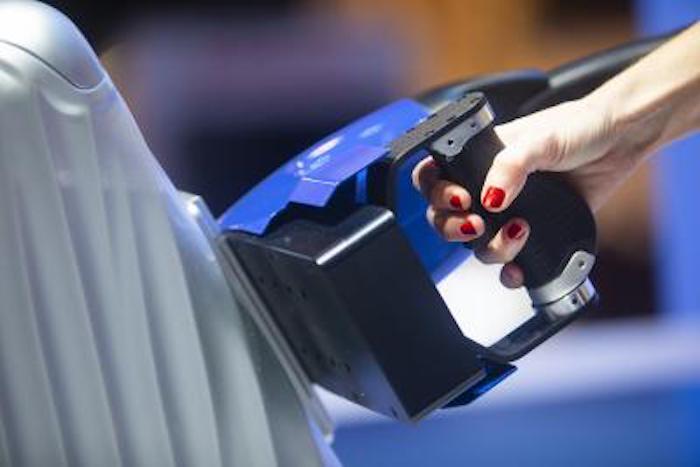
Potential uses at Delta could include handling freight at cargo warehouses, moving maintenance components, or lifting heavy machinery and parts for ground support equipment. Delta plans to test the technology in a pilot location during the first quarter of 2020, giving employees the opportunity to experience the tech in a real-world setting and provide additional feedback on its functionality.
In addition to enhancing human strength for extended periods, the robotic suit may also level the playing field in terms of physical capacity. Roles that have historically been limited to those who meet specific strength requirements could potentially be performed by a more diverse talent pool, thanks to wearable robotics.


